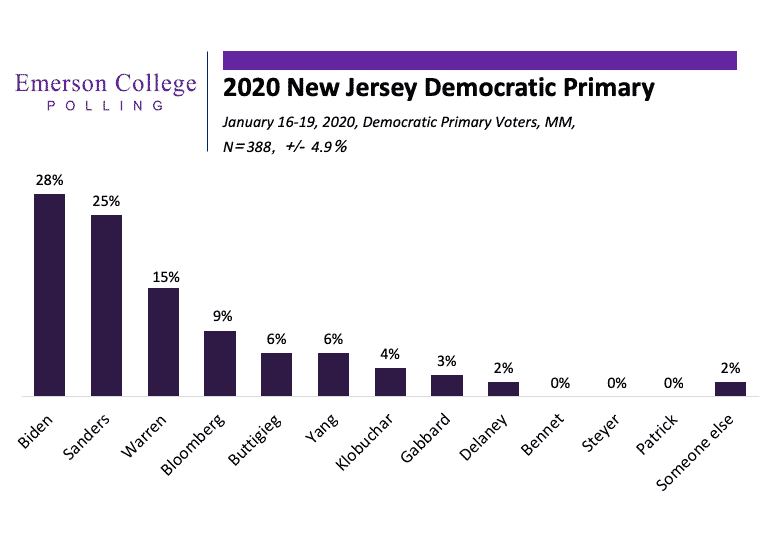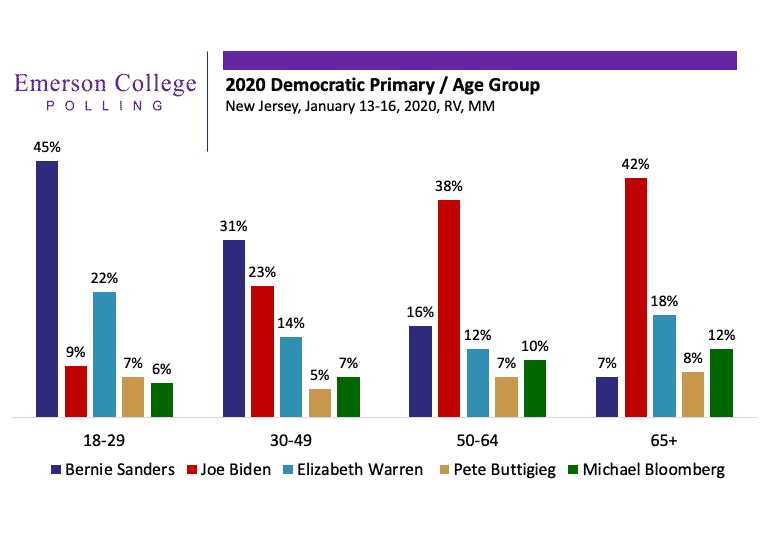A new Emerson College Poll looks to the end of the nomination process, the June 2 New Jersey primary. At this point, former Vice President Joe Biden leads the state with 28% of the vote, followed by Senator Bernie Sanders at 25%, Senator Elizabeth Warren at 15%, former Mayor Michael Bloomberg at 9% and former Mayor Pete Buttigieg and Andrew Yang tied for 5th at 6% each. The data was collected January 16-19, 2020, mix mode, n=388, +/-4.9%.

Spencer Kimball, Director of Emerson College Polling notes that “Bloomberg’s 9% is the highest we have seen for the former New York Mayor in any state poll this year. If his late start strategy is going to work, he will need to perform well in delegate-rich states such as New Jersey at the end of the nomination season.”
In New Jersey, Biden continues to be popular with older voters, 40% of those over 50 support him. Biden continues to struggle with younger voters, taking only 9% of the vote of those between 18-29 years old. In contrast, Sanders captures the youth vote with 36% support of those under 50, but the Vermont Senator has only 7% support of those over 65. Warren is the third most popular candidate in all four age groups with a range of 12% to 22% support.

Biden leads overall with female voters at 29%, followed by Sanders at 22% with female voters, and Warren with 19%. Males break for Sanders at 28%, then Biden at 27% and Warren at 11%.
Sanders leads among Hispanic voters with 31%, followed by Warren with 28%, and Biden with 16%. Among African American voters, Biden leads with 47% of the vote, followed by Warren at 17% and Sanders at 14%. This bodes well for Biden as it mirrors his exceptionally strong African American support in South Carolina, one of the first primaries. White voters in New Jersey break toward Sanders at 27%, then Biden at 23%, and 13% prefer Warren.
About half of Democratic primary voters (48%) say they will definitely vote for the candidate they prefer now, while 52% indicate they could change their mind and vote for another candidate by June.
While the Democratic primary race appears to be split, a majority of voters (55%), indicate they expect Biden to be the nominee. Sanders is the next expected choice at 22%, and Warren is at 10%. Of those voting for Biden, 84% expect him to be the nominee, with only 4% of Biden’s voters think Sanders will be the nominee. A majority of those (57%) voting for Sanders expect him to be the nominee, followed by 35% who believe Biden will get the nomination. A plurality of Warren voters, 42%, think Biden will be the nominee.
Kimball points out that “we saw a similar pattern in New Hampshire last week of Biden supporters being more confident in their candidate than Sanders supporters, and as the primaries begin we will see whether the Biden supporters are overconfident or if the Sanders supporters have something to worry about.”
On the Republican side, President Trump dominates his Republican rivals with 93% of the vote (n=197, +/- 6.9%).
Voters were asked about the impact of their representative in Congress voting in favor of the impeachment of President Trump – if it would make them more likely, or less likely to support his or her re-election next year; or, would their congressperson’s vote on impeachment have no effect on who they would support for Congress next year.
On this question, 41% of voters said voting in favor of impeachment would make them more likely to support the congresspersons’ re-election, 34% said it would make them less likely to support reelection, and 25% said it would make no difference in their vote.
However, support for impeachment varied across the state, with strongest support in the Newark region of the eighth, ninth, and tenth congressional district, with 48% of those polled saying they would be more likely to support their congressperson and 19% less likely to support. The first congressional district around Camden supports their representative, Donald Norcorss vote for impeachment 46% to 28%, along with voters in the central regions (District 6 and 12), with 44% more likely to support their congresspersons as contrasted to 35% who are less likely to support due to the affirmative votes for impeachment.
The northern region of the fifth, seventh, and eleventh congressional districts are split with 41% less likely to support, and 40% more likely. The strongest opposition to the vote for impeachment is in the southern part of the state – in the second, third and fourth districts, where 42% are less likely to vote for a Representative who voted to impeach, and 32% are more likely to support.
Caller ID
The New Jersey Emerson College poll was conducted January 16-19, 2020 under the Supervision of Assistant Professor Spencer Kimball. The sample consisted of registered voters, n=788, with a Credibility Interval (CI) similar to a poll’s margin of error (MOE) of +/- 3.9 percentage points. The data was weighted based on 2016 voter model of party affiliation, age, race, education, gender and region. It is important to remember that subsets based on gender, age, party breakdown, ethnicity and region carry with them higher margins of error, as the sample size is reduced. Data was collected using both an Interactive Voice Response (IVR) system of landlines only (n= 485) and an online panel provided by MTurk (n= 303).






